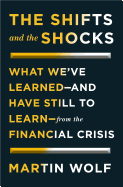 Martin Wolf (Get this book)
Martin Wolf (Get this book)An editor for the Financial Times weighs in with a scholarly analysis of what caused the financial collapse of 2008 and provides suggestions to prevent a recurrence. Wolf offers a highly organized, detailed and, at times, somewhat dense text-at least for general readers. It's also a text with attitude. Although his view is global, he focuses often on the United States and on the United Kingdom and discusses sharply how (in the U.S.) partisan politics often trumped common sense before, during and after the crisis. He argues throughout that austerity plans were exactly the wrong things to implement and that government stimulus plans were too small to be as effective as they could have been. Closely reasoned, highly organized and logical-and stiffly challenging.--Kirkus


